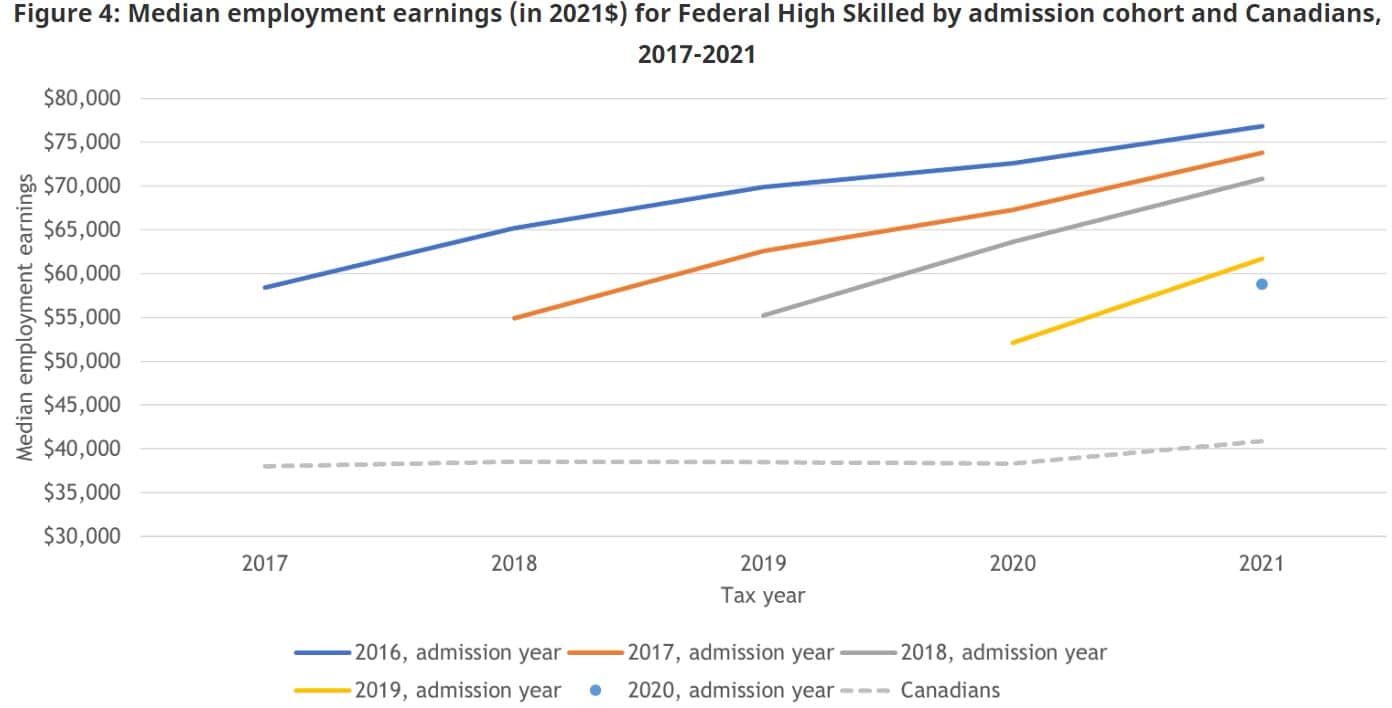
Newcomers who immigrate to Canada through an Express Entry-managed program often see a rapid increase in their median employment income during their first five years in Canada.
This is according to the 2023 Year-End Express Entry report. Immigration, Refugees and Citizenship Canada (IRCC) included data that shows the median income of newcomers through an Express Entry managed program is higher than that of Canadian-borns.
The data analyzes the median employment incomes of Express Entry candidates admitted between 2016 and 2021.
Earnings are continuously rising.
Candidates under Express Entry have continuously experienced favorable long-term economic results since the program’s launch in 2015.
For instance, the 2023 study revealed that median employment earnings for those accepted in 2016 increased to $58,400 in 2017 and then to $76,800 in 2021 (five years after landing). Additionally, it states that the typical income of newly enrolled students in 2018 was $55,200 in their first year of employment and increased to $70,800 three years later. This demonstrates how quickly newcomer earnings increased.

Over the course of the five years, the median employment income for Canadians remained largely unchanged, averaging only $40,870 in 2021 (compared to $38,006 in 2017).
Newcomers who enter the country under a federal program for highly skilled workers, like Express Entry, are frequently qualified to fill positions in the labour market in Canada. Based on their Comprehensive Ranking System (CRS) score—which assesses individuals’ in-demand human capital traits such language proficiency, work experience, vocation, age, and education—they are asked to apply for permanent residence status. According to IRCC, persons who have the highest CRS ratings have the best chance of assimilating into the Canadian economy.
The IRCC advanced this idea in 2023 by instituting invitation-only rounds of selection based on categories. Rather than receiving an overall high CRS score, Express Entry candidates are invited in these draws based on a particular criteria, usually their job experience. There is currently no information available on the economic effects of these arrivals.
In contrast, the median salary of economic immigrants admitted to Canada via a Provincial Nominee Program (PNP) stream that is not associated with Express Entry is often lower. According to the report, after a year of admission, the median job wages for the PNP entrance cohorts varied from the mid-$40,000s to the low $50,000s.
There is little effect of additional score criteria on income.
The survey points out that additional information submitted with an Express Entry application may have an impact on median salaries. On the other hand, unless candidates achieved the maximum possible scores for these traits, additional scoring criteria do not always translate into higher median wages two to three years after admission, according to report data.
For instance, it discovered that candidates with a three-year or longer post-secondary certification from a Canadian university who were allowed to Canada in 2019 had somewhat higher median job earnings than those without such a credential.
On the other hand, the median salary of individuals admitted in 2019 who held a post-secondary Canadian credential for one to two years was less than that of those who had no post-secondary education in Canada ($51,000 vs. $61,100).
For those with siblings living in Canada, the same applied. For those who arrived in 2019, the typical salary two years after arrival was $53,100 for those who had a sibling who was a Canadian citizen or permanent resident, compared to $61,200 for those who did not.
Those with pre-arranged employment in other occupations were also found to have higher median incomes than those who did not. For example, those who arrived in 2018 with an “other” job offer had median incomes of $84,500 while those without an arranged employment reported a median income of $60,700.